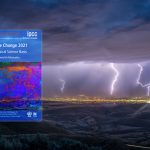 September 7, 2021 12:17 pm
Published by Climate Extremes
September 7, 2021 12:17 pm
Published by Climate Extremes
To better understand the implications of the latest climate science for Tasmania, this brief combines information from the IPCC AR6 WG1 report, with regional assessments that contributed to the UTAS Blueprint for a climate-positive Tasmania, and expertise from the Australian Research Council Centre of Excellence for Climate Extremes (CLEX). The regional information is based on Tasmania-specific downscaled modelling undertaken by Climate Futures for Tasmania.
 August 25, 2021 3:37 pm
Published by Climate Extremes
August 25, 2021 3:37 pm
Published by Climate Extremes
The Paris Agreement requires countries to commit to reducing their greenhouse gas emissions to ensure that the global average temperature remains well below 2°C above pre-industrial levels and to pursue efforts to limit the temperature increase to 1.5°C. But how likely are we to meet these targets?
 August 9, 2021 6:00 pm
Published by Climate Extremes
August 9, 2021 6:00 pm
Published by Climate Extremes
Australian researchers in the ARC Centre of Excellence for Climate Extremes have made major contributions to the 2021 IPCC Working Group 1 report, through the authorship of the report, review and the many scientific papers cited in the report.
 July 28, 2021 2:43 pm
Published by Climate Extremes
July 28, 2021 2:43 pm
Published by Climate Extremes
Irrespective of tipping points, climate change adaptation efforts will be less costly and disruptive to society – and will stand a better chance of success – if warming can be limited to 1.5°C rather than 2°C or higher. We therefore in no way advocate for policies that forgo pursuing the ambition to limit global warming to 1.5°C, regardless of whether that target remains feasible or not.
 June 23, 2021 10:41 am
Published by Climate Extremes
June 23, 2021 10:41 am
Published by Climate Extremes
Climate sensitivity describes how sensitive the Earth’s temperature is to a doubling of the amount of carbon dioxide in the atmosphere. One measure of climate sensitivity for projections of future climate is the Equilibrium Climate Sensitivity (ECS). ECS is the increase in the global average temperature between the pre-industrial era and a future doubled carbon dioxide climate once equilibrium of the climate has been reached.
 May 19, 2021 11:57 am
Published by Climate Extremes
May 19, 2021 11:57 am
Published by Climate Extremes
The Royal Society has called for an international next-generation climate modelling centre (pdf), based on new cutting-edge high-performance computing and data services to support efforts toward net-zero emissions and to enable effective climate adaptation.
 April 7, 2020 2:51 pm
Published by Climate Extremes
April 7, 2020 2:51 pm
Published by Climate Extremes
Research has established a link between Antarctic stratospheric winds and an increased risk of weather conducive to bushfires from late spring to early summer. Further research on the relationship between winds and ozone in the Antarctic stratosphere could improve seasonal forecasts for Australia.
 December 11, 2019 11:11 am
Published by Climate Extremes
December 11, 2019 11:11 am
Published by Climate Extremes
This research brief examines how research from the ARC Centre of Excellence for Climate Extremes informed the IPCC Special Report on Climate Change and Land.
 September 20, 2019 3:06 pm
Published by Climate Extremes
September 20, 2019 3:06 pm
Published by Climate Extremes
In an hour-long talk to a business forum, Andy Pitman said: “there is no link between climate change and drought”. Given the audience were not climate scientists, or interested in the physics of the climate, this statement was one word too brief. Andy fully admits he should have said: “there is no direct link between climate change and drought”.
 August 14, 2019 11:39 am
Published by Climate Extremes
August 14, 2019 11:39 am
Published by Climate Extremes
The ARC Centre of Excellence for Climate Extremes has contributed to a new scientific study that reveals that extremely hot and cold temperatures, drought and heavy rainfall strongly affect the year-to-year variation in the total global yield of four important crops.










